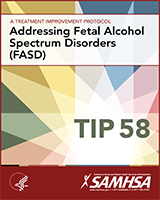| COUNSELOR: | Okay, thank you. I think I have a sense of your concerns, both for Desmond and for your own situation. |
|---|
| MIKE: | Yeah. I mean, this is one tough gig. |
|---|
| COUNSELOR: | It is, and feeling “burned out” is natural. At the same time, if Desmond is going to be on his own to some degree, as he moves into his life as a young adult, that means a huge transition for both of you. |
|---|
| MIKE: | That's an understatement. |
|---|
| COUNSELOR: | The good news is that I can provide you with some strategies to help you cope, in the short-term and the long-term. The key here is that the definition of independence and safety is different for a person with an FASD or other developmental disabilities. I think it's important that we start by identifying one or more advocates or “champions” for Desmond. These can be professionals or family members; people who are willing to help him—and help you—manage various parts of his life. So, who can act as an advocate for Desmond? Who are his supports? |
|---|
| MIKE: | I can be an advocate, first and foremost. And so can my aunt. Desmond gets along with her really well and sometimes she has him help at her law office doing filing, that kind of stuff. Also, she is one of the few people he'll talk to when he gets upset or angry, and she's good at calming him down. He also helps out with the middle school football team, so Coach Gray looks out for him, but they don't see each other much in the off-season. But…I think he would still be willing to help Des out. Yeah, I think they can help when I can't. And maybe Des can reconnect with his mom. |
|---|
| COUNSELOR: | It sounds like Desmond has a number of advocates and supports, but that he mayneed help with both identifying when he needs help and, then, how to best communicate to get that help. I am so impressed and pleased that Desmond is involved with your aunt and Coach Gray. That gives Desmond's days and weeks more structure and meaning and more opportunities to connect socially. Everyone likes to feel useful! I bet there are more folks who can act as support persons or advocates. We'll try to figure out all those folks in our next session, and what each support person can do. To help move us along, here is the first page of a worksheet to do at home, to make a list of people you think of, their contact info, and what kinds of things they can help with.
[Shows Mike the first part of the Crisis/Safety Plan Worksheet.]
Think about family friends, any providers that work with Desmond, people who know him in his circles, like other people that help with the football team or friends from the community, kids from his high school youth group, church, anything like that. If possible, it is especially important to find someone in their 20's—more Desmond's age, who has good problem-solving skills, to be a kind of “mentor.” Can you bring that back next time? |
|---|
| MIKE: | [Nods, takes the first part of the Crisis/Safety Plan Worksheet.] I'll try to get it done. I don't know about that mentor idea; can't think of anyone right away. But it does help to write things down. If I don't have time for the worksheet… well, you know. |
|---|
| COUNSELOR: | Sounds good. This may be a chance to ask your aunt and Coach Gray for ideas, too, as there may be someone that Desmond already knows that could be a good mentor. In terms of the worksheet, I will leave that to you. |
|---|
